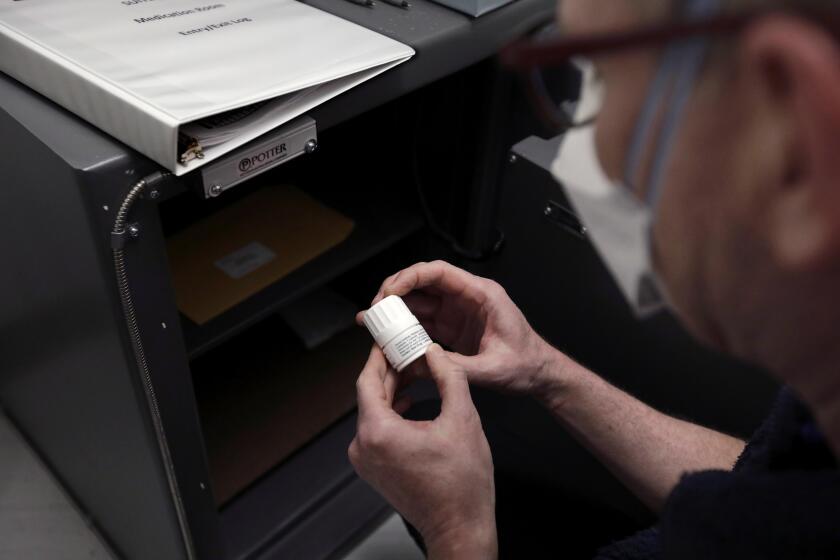FDA orders warning on three anemia drugs
The Food and Drug Administration said Friday that three widely used anemia drugs sold by Amgen Inc. and Johnson & Johnson would be required to carry a safety warning that they could cause serious side effects, including death, when used in higher doses and given to some patients.
The news was another setback for Amgen, which sells two of the three medications under the names Epogen and Aranesp. They account for nearly half of the Thousand Oaks-based biotech giant’s revenue. Amgen stock fell 2.1% on Friday.
The largely expected “black-box warning” -- the strongest type possible for prescription drugs -- could prompt doctors to pull back even further on prescribing the drugs. Many doctors had already cut usage of the treatments, prescribed to more than 1 million people in the U.S. each year, in the wake of five research reports in recent months that raised serious safety questions about the drugs when used by some patients.
None of the studies have been conclusive, but the number and pace of the research have raised worries among doctors, federal regulators and Congress.
“This was a very prudent decision,” Dr. John Glaspy, director of the Outpatient Oncology Center at UCLA’s Jonsson Cancer Center, said of Friday’s FDA announcement. Glaspy said the move would probably lead doctors to become much stricter about prescribing the drugs and significantly reduce the number of patients on the drugs.
The drugs, all from the same class of the drug erythropoietin, are sold under the brand name Procrit by Johnson & Johnson, and Epogen and Aranesp by Amgen.
The medications, which help kidney and cancer patients who become anemic from needing repeated and potentially dangerous blood transfusions, have become enormously popular in recent years and are now the largest medicine expense for the federal Medicare program.
In a statement, the FDA said it was reevaluating the safety of the drugs in light of recently completed studies that showed an increased risk of death, blood clots, strokes and heart attacks in some patients when given at higher-than-recommended doses.
In other studies, more rapid tumor growth occurred in patients with head or neck cancer who received higher doses.
In a news conference Friday, Richard Pazdur, director of the FDA’s cancer drug office, said the agency had recommended that doctors use the lowest doses needed to help patients avoid blood transfusions.
A separate FDA panel is expected to review the use of the drugs in oncology patients in the coming weeks. And Congress is expected soon to follow up on hearings it had begun late last year on the safety and costs of the anemia products.
In a statement, Amgen said it would immediately comply with the FDA’s decision and revise the label for its drug.
Amgen “is committed to providing timely and appropriate communications to physicians and patients whenever we become aware of new safety information that could affect clinical practice,” the company said.
Craig Tendler, a vice president at Johnson & Johnson unit Ortho Biotech, said, “We remain confident in the safety and efficacy of Procrit when used according to its label.”
Erythropoietin drugs are typically prescribed to boost levels of hemoglobin in the blood to 12 grams a deciliter, although some doctors use higher doses to raise the hemoglobin above that in certain cases with the hope it will produce better results. The normal hemoglobin level is about 15 grams per deciliter.
Many physicians defend the practice but critics point out that oncologists make a significant share of their income buying cancer drugs at wholesale prices and then selling them to patients for a higher price.
Although Glaspy of UCLA said that he did not believe such considerations had influenced doctors’ clinical decisions, the FDA announcement would make them “think twice about aiming for higher hemoglobin levels.”
Many doctors and industry experts are now awaiting the results of an Amgen-sponsored trial on Aranesp in lung cancer patients. Experts believe that the trial’s results could be a make-or-break moment for the class of drugs.
Aranesp is Amgen’s top-selling product, generating $4.12 billion in revenue last year. Aranesp and Epogen together accounted for 47% of the company’s sales. Johnson & Johnson’s Procrit had $3.2 billion in sales last year.
Amgen shares fell $1.31 to $60.86 on Friday. Johnson & Johnson rose 42 cents to $62.14.
*



